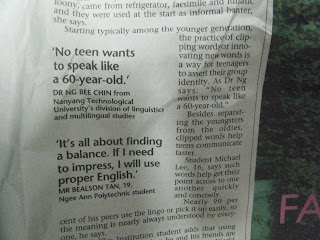


Enthu. Unglam. Emo. Noob.
Do all these words sound familiar to you? If not said on a regular basis, most of you have most likely said these words at least once or twice to your peers before. And all these words, also known in the field of linguistics as ‘clipping’, are apparently creating a headache for parents of youths as they are finding it increasingly harder to communicate and understand their children. They also disapprove of the usage of such language as they feel that it is a form of slang and so, ‘improper’ English, but to the youths, this language is what sets them apart from the adult population.
So is the use of such lingos really that worrisome? It seems to be a divided opinion.
Adults like the interviewee, Serene Foo, seemed to feel so when she commented ‘It is just nonsense. It just doesn’t sound like English to me’, as do Mr Goh Eck Kheng, chairman of the Speak Good English Movement when he cautioned how slang is not acceptable in formal settings. However, the youths seemed to find no cause of worry at all, and I find myself agreeing with them. As quoted from Bealson Tan of Ngee Ann Polytechnic, ‘It is all about finding a balance.’
As much as parents still think that their children are still ignorant because of their age, I feel that because of the studying environment and general upbringing Singaporean youths these days grew up in, they have become smart enough to differentiate for themselves whether it is appropriate or inappropriate to use lingos for the different situations. Slangs might come out naturally from their mouths when they are in a casual gathering with friends but it is unlikely you will see them carry it over to more important and serious occasions like project presentations or during examinations.
Just as much as Singlish is a Singaporean lingo, this new form of word clipping is just a lingo formed by youths to feel different from the adults and in a way, to communicate quicker and more efficiently with each other. Moreover, looking on the bright side, although these words are shortened forms of proper English words, at least it is still words derived from real words. That still makes it in a way, a level higher then the regular Singaporean lingo doesn’t it?
(Credits: The Sunday Times, Lifestyle 31/05/09)



